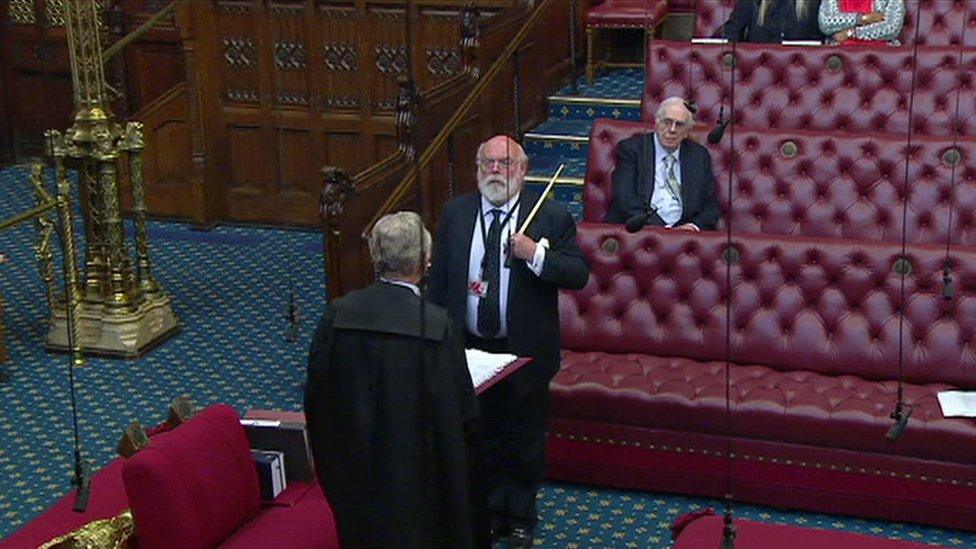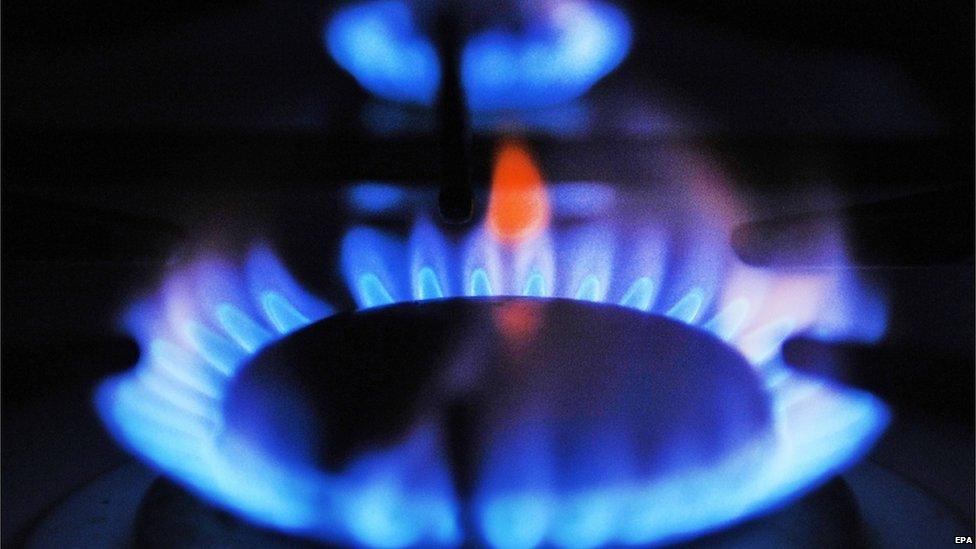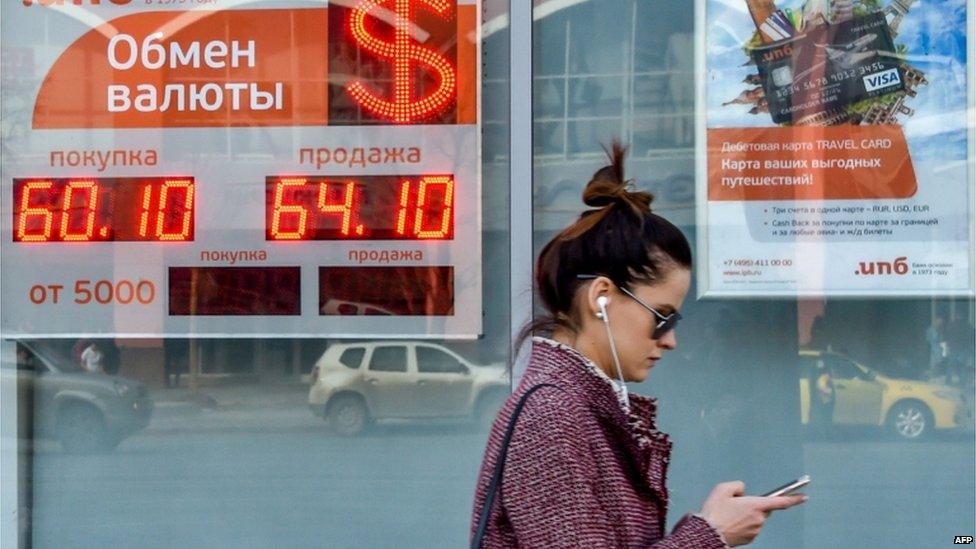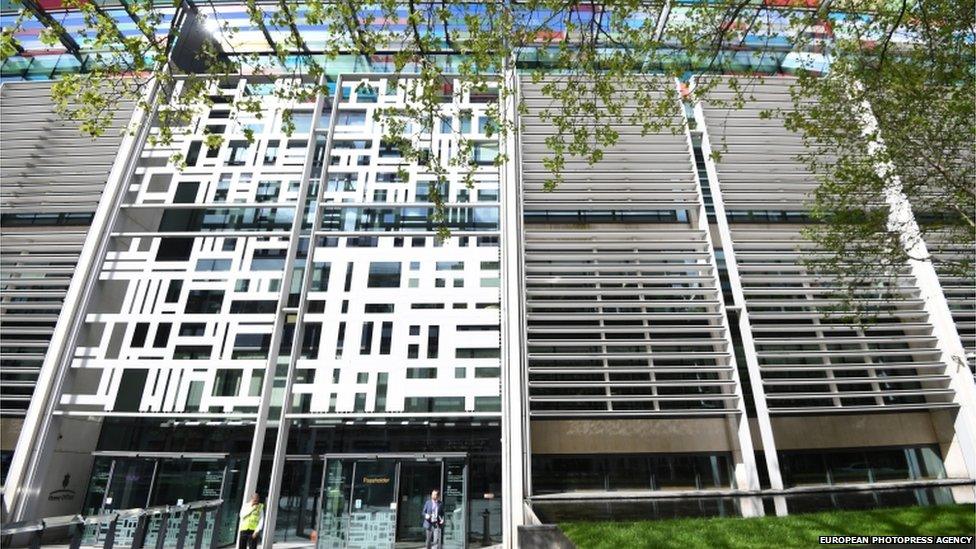What's on in Parliament?
- Published
- comments
A combination of the latest Brexit manoeuvres, a beleaguered home secretary and an important round of local elections should mean plenty of fizz in Parliament next week.

The government has been defeated several times in the Lords during the passage of the EU Withdrawal Bill
A clear sign of a fluid political situation is the sudden outbreak of halo-polishing among potential Tory leadership contenders - but this is a week which could offer stumbling blocks to a variety of ministers in a variety of parliamentary venues.
The government faces a backbench rebellion orchestrated by former chief whip Andrew Mitchell, on Tuesday during debate on the Sanctions and Anti-Money Laundering Bill, external - and the numbers he has mustered are such that the smart move for ministers might be to embrace the amendment he has produced with Labour's Margaret Hodge, on financial transparency in tax havens in UK overseas territories.
The predictable drubbing ministers are receiving in the Lords, over the EU (Withdrawal) Bill looks set to continue, meaning more difficult votes in the Commons on tough Brexit issues, further down the line.
A longer term worry for ministers will be the muscle-flexing on the committee corridor, where Sarah Wollaston's Health Committee, fresh from forcing the government to embrace a tax on sugary fizzy drinks, is holding more hearings on childhood obesity, which will probably feed into an attempt to drive anti-obesity policy.
So there are plenty of hazards to trip ambitious ministers, or alternatively give them a change to demonstrate sure-footedness - and that's before we get to the full dress Opposition Day attack on the Home Secretary Amber Rudd over the Windrush issue.
And, as ever, some of the biggest events of any parliamentary week are around urgent questions and ministerial statements that are only scheduled at the beginning of each sitting day - so I can't usually predict them in advance.
Here's my rundown of the Westminster week ahead:
Monday
The Commons opens (2.30pm) with Housing, Communities and Local Government questions. The usual clutch of post weekend statements and UQs can be expected at 3.30pm.

Then MPs polish off two bills. First the Domestic Gas and Electricity (Tariff Cap) Bill, external - where there are competing sets of amendments from Labour and Conservative backbenchers on the theme of limiting the permissible difference between the cheapest advertised rate and the most expensive rate.
The key difference seems to be whether that cap would be a temporary expedient while the energy market was reformed, or a permanent restriction. There are also amendments on the need to protect vulnerable customers, including ensuring those who currently benefit under a safeguard tariff.
I'm not sure the backbench Conservative amendments will be pushed to a vote, since the game appears to be to try and influence the government rather than inflict another Commons defeat, but there is clear backbench discontent about what some see as a ham-fisted intervention in the energy market.
After that, MPs turn to the Laser Misuse (Vehicles) Bill, external, which strengthens the rules on shining lasers at aircraft, and, for the first time, makes it an offence to shine a laser at cars, trains, ships and air traffic control. The bill has already been through the Lords and seems to be in good shape, given that as I write there are no amendments down. So this looks like a very rapid rubber-stamping exercise.
In Westminster Hall, the Petitions Committee has scheduled a debate on a Windrush-related e-petition, no 216539, external which calls for an immigration amnesty for anyone who arrived In Britain as a minor that between 1948 to 1971.
It calls on the government to stop all deportations, change the burden of proof and establish an amnesty for anyone who was a minor - as well as providing compensation for loss and hurt. It has attracted 177,305 signatures.
My committee pick is the Housing, Communities and Local Government hearing (4pm) on the planning guidance on fracking - the controversial method of extracting oil and gas embedded in shale underground. The witnesses include the frackers and anti-fracking campaigners.
In the Lords (2.30pm) the main event is day 4 of report stage consideration of the EU (Withdrawal) Bill, external.
Peers have already made some major changes to the bill - and the government has been defeated by majorities ranging from 50 votes to 128.
And the debate on this may be the most important so far - on setting the terms of Parliament's "Meaningful Vote" on Britain's divorce deal. The key amendment is number 49, external, proposed by a tell-tale list of cross-party heavyweights, in this case Viscount Hailsham (the Major-era cabinet minister Douglas Hogg); the crossbench former diplomat Lord Hannay; Labour's Brexit spokespeer Baroness Hayter and the senior Lib Dem Lord Wallace of Saltaire. This kind of list, signalling a carefully assembled coalition of support, has become the hallmark of the most important amendments.
This one gives Parliament a vote before ministers can walk away with 'No Deal' and allows the Commons to decide what course of action the government should take - in the event of Parliament rejecting the draft withdrawal agreement, the promised additional statute, or the 'No Deal' scenario.
This is looks like the vehicle for a Remain counterattack, because it puts ministers and their Brexit strategy much more firmly on a parliamentary leash than does the "Grieve amendment" passed by the Commons. It would be a surprise if peers didn't vote this through, probably with a big majority; but it must be the amendment minsters would most wish to strike out, when the bill bounces back to the Commons.
Tuesday
The Commons opens (11.30 am) with Business, Energy and Industrial Strategy questions.
The Scottish Conservative Alister Jack has a Ten Minute Rule Bill tidying up the law around putting penalty points on a driving licence - his Road Traffic Offenders (Surrender of Driving Licences etc.) Bill will mean that licences will no longer have to be handed over or posted in before a person can accept a fixed penalty notice or conditional offer.

Then come the report and third reading debates on the Sanctions and Anti-Money Laundering Bill, external.
Expect some major action over a backbench amendment co-sponsored by the former International Development Secretary Andrew Mitchell and the former Chair of the Public Accounts Committee, and campaigner for tax transparency, Margaret Hodge.
They want to require tax havens under UK jurisdiction to set up public registers of beneficial ownership of companies registered there. The amendment has 40 signatures, including 19 Conservatives, which should be enough to pass it, even if the government resists.
They hope, therefore, that ministers will accept it, however reluctantly.
In addition, the government is offering amendments to add a "Magnitsky Clause" to the bill, allowing personalised sanctions against individuals where there are reasonable grounds to believe they are implicated in gross human rights abuses - like the murder of the Russian accountant Sergei Magnitsky, who blew the whistle on massive fraud in his country.
The government resisted Labour amendments along these lines during the committee stage of the bill, but, in the wake of the Salisbury poisoning, it has now changed its mind, and the Foreign Office minister Sir Alan Duncan has agreed new amendments with Labour.
In Westminster Hall, the Labour MP Bambos Charalambous leads a debate (9.30am) on safeguarding children and young people in sport. This follows up the case of one of his constituents who was a victim of the football coach Barry Bennell, who was found guilty of sexual abuse. He wants to identify any loopholes in the laws and safeguarding system, and to examine what steps have been taken by sport governing bodies.
Labour's Nick Thomas Symonds leads a debate on bowel cancer screening (11am), and later, at 2.30pm the Chair of the All Party parliamentary Group on Cancer, John Baron, has a debate to raise the APPG's continuing concerns that all of the £200m cancer transformation funding is getting through to the NHS front line.
Other debates are on solitary confinement of children in the justice system (4pm) and on the global ban on cosmetic animal testing. The SNP's Dr Lisa Cameron, who is leading the debate, says that over 80% of countries globally still allow animal testing for cosmetics. She says the campaign to ban cosmetic testing on animals worldwide has overwhelming public support and should be adopted in a resolution by the UN.
My committee pick is Health and Social Care Committee's hearing on childhood obesity (2.30pm) which features evidence from superchef Jamie Oliver and a series of nutrition experts.
In the Lords (2.30pm) the main business is consideration of Commons amendments to the Financial Guidance and Claims Bill, external - there may still be some attempt to toughen up the bill's provisions on cold calling to sell financial products.
After that peers will rattle through a series of orders and regulations including one on Royal Wedding Licensing Hours.
Wednesday
MPs open (11.30am) with Welsh questions, followed at noon by Prime Minister's Questions.
The DUP's Emma Little Pengelly has a Ten Minute Rule Bill on support for victims who have been severely injured or bereaved as a result of acts of terrorism and to a set up a review of pension support for them.

Home Office policies will continue to be under scrutiny by MPs
Then, Labour will look to keep up pressure on the Home Secretary, Amber Rudd, with an Opposition Day debate on Windrush and creating a "hostile environment" for illegal immigrants. At the moment the Tory troops are rallying around her - but the steady drip drip of revelations about the conduct of immigration policy has not helped her.
In Westminster Hall, the subjects for debate are: the case for HPV vaccination in boys (9.30am); the working conditions of prison officers (11am); government policy on reducing plastic waste in the maritime environment (2.30 pm); ticket touting and musical events (4pm) and grandchildren's access right to their grandparents (4.30pm).
On the committee corridor a familiar figure returns - the former Chancellor George Osborne gives evidence to the Education Committee on education in the north (10am) in his role as chair of the Northern Powerhouse Partnership.
In the Lords (3pm) it's devolution day in the detailed consideration of the European Union (Withdrawal) Bill..... this includes one of the touchier facets of the bill, the section dealing with EU powers which had been promised to the devolved administrations.
This covers issues like farm subsidies, food labelling and even fertiliser regulation....and unusually the key amendments are the ones proposed by the government, having struck a compromise deal which has peeled the Labour government in Wales away from its alliance with the SNP administration in Holyrood.
One snag with this debate is that the SNP have no peers - they don't, on principle, appoint members to the Lords - but some of their arguments may be made for them by Plaid Cymru peers and maybe others.
Thursday
MPs meet at 9.30am for Brexit questions - but the benches may be rather thinly populated, given that it is local election day in London and many other urban areas. Conscious that the troops may be deployed elsewhere, the House business managers have made sure that nothing particularly important is burdening the agenda - the main debate is on the May adjournment, one of those amorphous debates where any MP can speak on any subject.
In Westminster Hall (1.30pm), there's a debate on the Housing, Communities and Local Government Committee's report on the effectiveness of local authority overview and scrutiny committees, external.
In the Lords (11 am) peers debate a committee report on Brexit: sanctions policy, external.
Neither House is sitting on Friday.